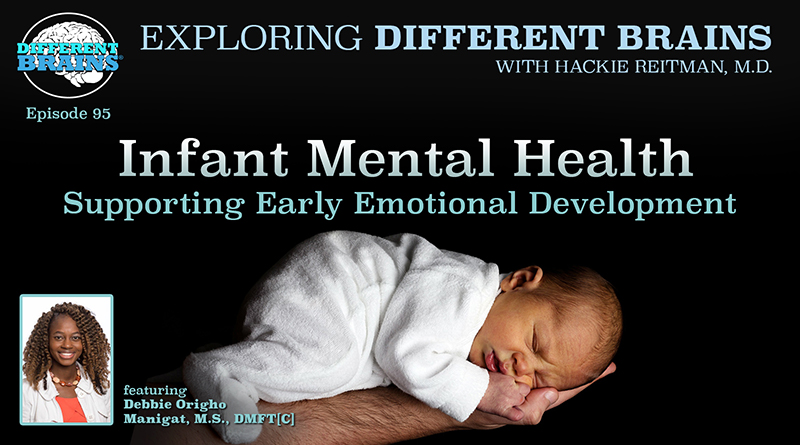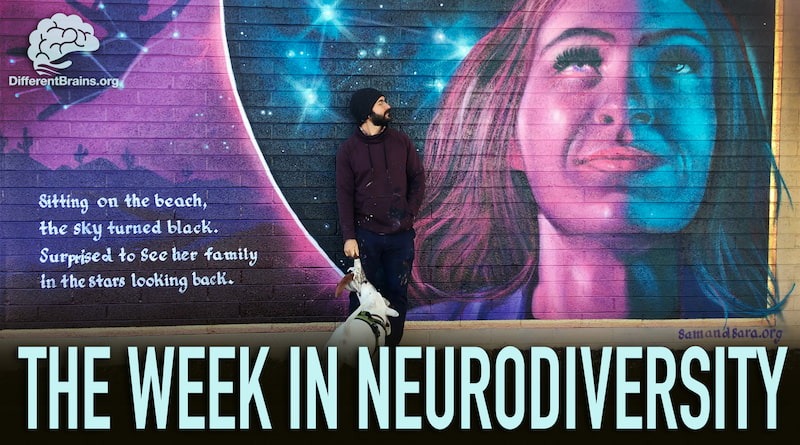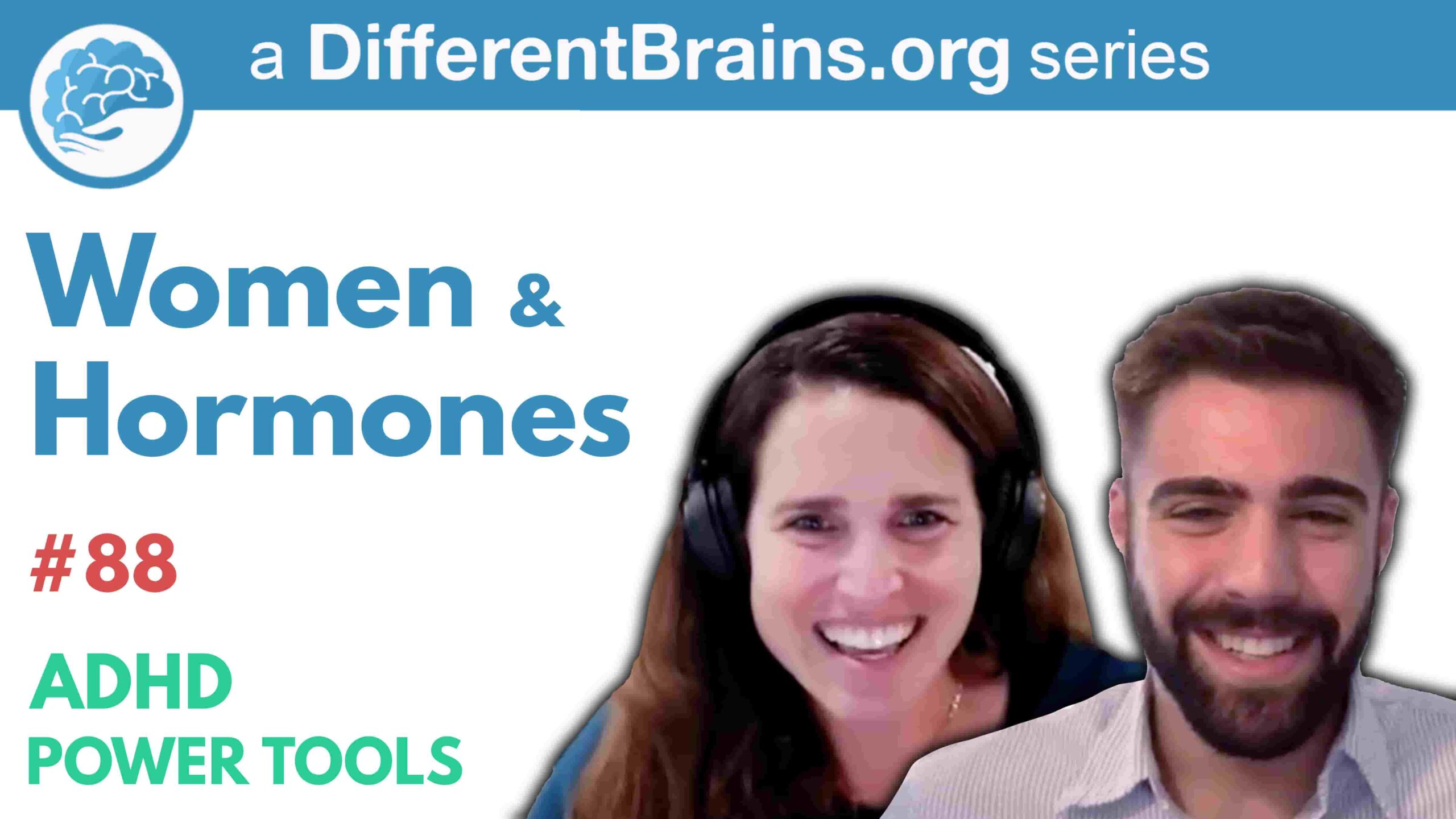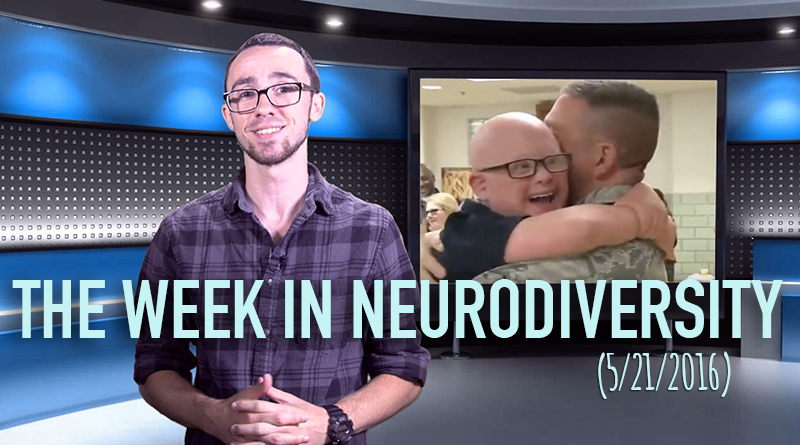
Infant Mental Health: Supporting Early Emotional Development, with Debbie Manigat | EDB 95
(24 mins) In this episode, Harold Reitman, M.D. speaks with Debbie Origho Manigat, M.S., DMFT(c). Debbie is a Wellness Counselor, a Mental Health Advocate, and a Early Childhood Mental Health Consultant. She is also one of the board members of Different Brains Inc. Debbie discusses the impact trauma can have on early childhood development, the concept of A.C.E.s (Adverse Childhood Experiences), and the repercussions of parental mental health on children.
For more about Debbie, visit: DMEmpowers.com
.
66 Second Preview:
.
To listen or download the podcast version of this episode, see the embedded player below.
Or look for us on your favorite podcast provider:
iTunes | Stitcher | SoundCloud
[expand title=”View Full Transcript”]
HACKIE REITMAN, M.D. (HR): Hi, welcome to another episode of Exploring Different Brains, I’m Dr. Hackie Reitman and today we have with us Debbie Manigat, and Debbie is a family therapist, marriage counselor, a freedom coach, in her spare time going for a PHD at Nova Southeastern University, and also just happens to be on the board of Different Brains. Debbie, Welcome.
DEBBIE ORIGHO MANIGAT, M.S., DMFT(c) (DM): Oh, thank you for having me. Can I call you Hackie or do we have to be formal?
HR: No, you can call me Hackie.
DM: No? No Dr. Reitman. Okay.
HR: You’ve got quite an interesting history. Why don’t you introduce yourself to our audience?
DM: Sure. Thank you so much for having me Hackie. It is truly an honor to be here, to see all the amazing things that you have accomplished over the years and to actually be a part of that journey. This is incredible, such an honor for me. So I don’t even know where to begin with my background in comparison. I will share that mental health advocacy is my passion within diverse communities, especially disadvantaged or at risk families. It’s important that they understand the stigma of mental health and how that effects their wellness overall. So I do a lot of work with volunteer groups such as NAMI or the Mental Health Association, the United Way. In my day job, I am a program specialist for the Children’s Services Council of Palm Beach County. I also work per diem for seven different organizations doing family therapy, play therapy, using art therapy techniques. And I’m also partnered with Family Central in Broward County, where I do a lot of different seminars and trainings on mindfulness for early childhood educators. So I’m a little bit of all over the place as some would say, but all purposeful, really trying to make an impact in the community and really help people thrive.
HR: What drove you to get into this field?
DM: Wow. That is a great question because I would not be here if it wasn’t for my humble beginnings. Growing up, my family endured a lot of past trauma. Some which they try to kind of protect us from. Unfortunately, in trying to protect us, in some instance, it did more harm than good. Now that I’m an adult and having the opportunity to learn about what really was going on in our family dynamic and specifically one family member who shared with me their struggle with clinical depression and having suicidal ideation and even past suicidal attempts really caused me to come to a point that I call my career versus my calling. In my career growing up, I loved to write, I was a part of the creative arts unit with the boys and girls club where we got to write different plays.
I continued into college for my under graduate studies, focused on communications, but then once I really learned what, not only my family was struggling with, but that this is truly a global concern around the world, one in thirty people struggle with suicide. That is a lot of people and I felt, how can I with this knowledge truly make a difference and that’s when I decided “Yo, I want to go back to school for my masters in marriage and family therapy as well as mental health and learn about everything that I can to really help not only my family but the community and ever since that, I have had so many opportunities to really volunteer to serve and to share this information with people across our state here in Florida, in Washington D.C., whether it was advocating with the National Council of Behavioral Health, speaking to legislators about mental health reform, and then also I share with you before, I was just so humbled and floored when I received the email from the White House, I actually thought it was fake. You know everyone gets some spam at times, so someone emails you from the White House and you have no prior communication with them, you’re thinking this is fake and then when I read through it and saw that this is real and I replied, it was incredible just to be invited because of the work that I’ve done in the community, to learn more and to connect with other leaders within the mental health field, focused on making health care better and particularly this was a session on suicide prevention.
HR: When you were a child, you had you’re share as you just shared with us of some trauma and history and then what lead you to the boys and girls clubs?
DM: Wow. So when I think about my up bringing, as I shared before very humble beginnings and being a family therapist now, I can honestly say that my parents I believed did the best that they could with what they had and sometimes you don’t know that you’re living in a toxic environment until you’re able to step out and reflect and look back and I will share that one of my family members and I can be very transparent because she’s giving me permission to share this. This is kind of her recovery process as well, my mom struggles with bipolar depression and it was severe. She was on medication through out my middle school and high school years but we never knew. So imagine being a rambunctious middle schooler, high schooler, thinking you know it all, you wanna have independence, you wanna drive, you wanna be free and along the way, as I look back, some of the things that we did and the decisions we made were very irrational. But from her mind state, it was completely fine. And now that I’m an adult, definitely, I would if I could go back and do things differently, I would definitely make sure that maybe even as a child that I could have supported my mom or even my dad and God bless him. They are still married today, they’re getting ready to celebrate their thirty-fifth anniversary and just thinking about all the things that he stood by her side with and supported her with I think is just unparallel because when you have certain situations or circumstances of drama and you’re a child, you’re relying on your parents to kind of led you, to show you what’s the right or wrong way and when you don’t have that, some people would say those are the children that we work the hardest for in social services to make sure they have a second chance, to make sure they have a brighter future and I’m just so blessed that through different programs like the great program, Gang Resistance Education and Training being offered at the Harold Reitman Boys and Girls Club.
That is where I had the opportunity to really learn and grow. Get positive relationships, have an opportunity to learn from leaders within my community that there is hope and that there is so much more to life and through being at ironically your boys and girls club, I had the opportunity I think to find who I wanted to be and what I wanted to do next in my life and I would say that’s really what led me to your club, the different programs, the different leadership opportunities that they offered and after being with the Harold Reitman Boys and Girls Club, I had an opportunity to join the creative arts unit, which is also a part of the Broward County Boys and Girls Club. Variety of programing and a part of that, I did three different plays where we had a chance to actually write the play, we had a chance to produce it, create the music, choreograph all of the dance moves and then at the end of, it was maybe like a three month practice, we’d actually put this play on for all of the students who were members of the boys and girls club at the Paradiso, if my memory serves me, theatre and we would do about four shows. We would do one on like a Friday, two on Saturday and then one on Sunday and those were just some of the most happiest memories that I have. Some of the actors or dancers and singers from there have gone on to do amazing things. I am not a singer at all, so we won’t do that today, but if you know one of the I guess famous pop singers, Jason Derulo, he was actually a part of the creative arts unit also and now he’s doing amazing things with his music career. So it is an honor and a privilege to have had the opportunity to learn and grow from the Boys and Girls Club of Broward County.
HR: Debbie, tell us more about the different ways nowadays, which is different than when I was growing up in the fifties and my parents gas station in Jersey City, playing stick ball and running around and getting expelled in the first grade and in the tenth grade. It’s a little bit different now. Tell us about the stress that young children feel and especially young children in the African American community and the intercity and the urban community who are under so many different stresses now in this day and age.
DM: Well, children have different reactions to stress. Some withdraw, some may not show any emotion at all, some completely act out and have tantrums, some have physical symptoms. The key here is how are we supporting them? How are we shifting our view from looking at children as “What is wrong with this child? Why can’t they just listen? Why can’t they just follow my directions?” to taking time to reflect, be mindful and saying “What has really happened here? What has happened in this child’s life?” Because once you understand and peel back the layers, that’s when you’re able to say, “Okay, this is why. Now, what can we do to come along side this family, this child to help them and support them?” And sometimes that might sound so easy. Okay, children need support, we know that. But it’s so critical and it’s an aspect that is missing today. Especially in social services when you think about social and emotional development. Starting from zero to five is so critical because those are the foundational years as I’ve shared before in infant mental health. I wanted to share some research with you and this is from Florida’s infant and young children’s mental health pilot project. Their final report were evidence suggest that the brains biological reactions to abuse and a lack of critical nurturing, especially in the early years, is an incubator of violence.
That to me is mind blowing. To know that evidence shows when parents are not nurturing their children, when they’re missing and children don’t have that one strong care giver in their lives. How that is, as they put, an incubator of violence. It’s determining their future because before they even have an opportunity to decide what they want to do because sometimes what they’re doing is all that they know. And so in my work, I try to educate the community, I try to educate parents, to know how valuable they are. Some people feel that, you know, it’s normal. I grow up, I get married, I have children, I’m doing what I’m supposed to do, but it’s so much more than that. The impact that you have in your child’s life changes them for the rest of their lives. And it also changes you. There’s some research in the Washington Post that shares that pregnancy changes the brain for as long as two years. Can you imagine that as a mom? Thinking that “Oh, you know I went to Howard. I have my bachelor’s. Oh, I went to Palm Beach Atlantic University. I have my master’s degree.” Then, now a mom and all of that goes out the window because it truly is a new part of live and in those periods where you may be sleep deprived, you may not have all the answers. What happens when your child is born with a disorder? Where they might need some developmental support? Where they have some speech issues? Some learning issues? That causes a lot of stress on a parent who had this ideal baby in their head but the real baby comes and you’re wondering, “how am I going to support this child?” or you’re feeling like “I’m not ready for this. This is not what I expected.”
And that’s where I come in as a family therapist to join you in that journey. To make sure that you are empowered, that you are educated and that you feel confident as a parent and that you are able to nurture that child during those critical periods where they’re learning how to talk from you, they’re learning how to walk from you, they’re learning the right things and wrongs things to eat from the parent. It all starts with them and so I find that truly a privilege to join with families in their most vulnerable state because you want people to see you as sometimes, “you know, I’m good. I’m fine. My kid’s great.” But what happens when that may not necessarily be the case to you. Now everyone is going to have a different view of what’s going on but what truly matters is what you think and what you’re feeling and if I can be there to help you along that journey to make sure that you feel well and that your child is well and not just for moms but for dads also.
HR: Explain to our audience what are Aces?
DM: ACEs are Adverse Childhood Experiences. So as I shared before, that could be your parent’s divorce, that could be childhood sexual abuse, that could be neglect, that could be any form of trauma that you perceived as trauma during your childhood that unfortunately as you progressed through adulthood may not have necessarily been resolved and can actually trigger and affect you health and by health I mean your physical health. Some people see it through somatic disorders, some people see it through experiencing ulcers, losing their hair, excessive weight gain, adverse ability in their sleeping routine, is affected whether that means they can’t fall asleep or they feel just sleepy all the time and they don’t want to get and get out of bed, so it can really affect your ability to thrive and your ability to really move forward with your goals and your future. Taking that opportunity recognize and really affirm what has really happen in your past and then to meet with a mental health counselor or a family counselor to address those issues so you can take some time to really go deeper and get on the road to recovery and healing. That is the best thing any parent can do. Any adult can do, especially before they have children because I love the new neuro science research on epigenetics and how they can actually prove that trauma is pass through the egg and the sperm to the offspring. It’s incredible and so fascinating.
HR: So let’s say we have a female, a young mom, first time mom, who doesn’t even recognize, say perhaps, she has post-partum depression. What happens?
DM: If she has post-partum depression, sometimes she may not be able to be fully there for her child, as if a mother who was fine and continuing to do her post-partum care as a pediatrician would assume her OBGYN has informed her. As a family therapist, I would work with the mom, also with the infant because of research that talks about epigenetics and how if a mom is going through some trauma, how it is passed to the child. So we want make sure that we’re taking that time and that moment to really help the mom be present to affirm that you are going through post-partum depression but that you can work through it and you won’t always have post-partum depression and ultimately you want to make sure that you’re present to give the nurturing to the child, to the best of your ability, considering your resources, considering your support. How the family dynamic plays a role if she’s married, if she’s not married, what other supports does she have to make sure that she is fully present for the child but also for herself as well. So having that opportunity to work with a family therapist, to share how you’re feeling, to get some guidance, to get some support. That’s a critical time.
Another aspect of infant mental health concerns, going through and understanding and recognizing what past trauma can do to the parent-child relationship. There’s new research called the Adverse Childhood Experiences study and that was actually a ground breaking research study that showed that past trauma can affect your health and well being when you become an adult. So that can be whether you have gone, whether your parents have gone through a divorce when you were a child, whether you’re wondering why am I going through heart disease or have high cholesterol, they have now actually targeted to Adverse Childhood Experiences that adults have had when they were child, so imagine an adult whose gone through all this trauma when they were a child and hasn’t address it and now they have a child that they are bringing into this world. What are they passing on to that child? How does their previous parenting affect their present relationship with their child. Sometimes people say we parent the way that we were parented and that term is also known as ghosts in the nursery. What has gone on in your past upbringing that you bring into the nursery or into your parent-child relationship that affects not only how you relate to your child but how your child perceives the world and how they continue to develop physically, emotionally. All of these factors play a role in infant mental health.
HR: How can people learn more about you and get in touch with you?
DM: Sure, I’d love to connect to them at my website. DMEmpowers.com or also on twitter, instagram and Facebook, also my handle is @DMEmpowers.
HR: Debbie Manigat, coach Debbie, it has been an absolute pleasure to have you here today at Different Brains.
DM: Thank you. Thank you for having me. Look forward to doing it again.
[/expand]
.
Different Brains® Inc. founder Harold “Hackie” Reitman, M.D. is an author, filmmaker, retired orthopedic surgeon, former professional heavyweight boxer, the past chairman and president (and current board member) of The Boys and Girls Clubs of Broward County, and a neurodiversity advocate. However, it was his role as a father that led to the creation of the DifferentBrains.org website.
Hackie’s daughter Rebecca grew up with epilepsy, 23 vascular brains tumors, and underwent 2 brain surgeries before the age of 5. Her struggles and recovery put him on the road to, through 26 professional heavyweight boxing matches, raising money for children’s charities (to which he donated every fight purse).
Rebecca eventually went on to graduate from Georgia Tech with a degree in Discrete Mathematics, and Dr. Reitman wrote and produced a film based on her experiences there (The Square Root of 2, starring Darby Stanchfield of ABC’s Scandal). After graduation, Rebecca received a diagnosis of Asperger’s syndrome. Hackie, shocked at his own ignorance of the topic despite being an M.D., embarked on years of research that culminated with his book Aspertools: The Practical Guide for Understanding and Embracing Asperger’s, Autism Spectrum Disorders, and Neurodiversity (released by HCI books, publishers of the Chicken Soup for the Soul series).
This experience revealed to Hackie the interconnectedness of the conditions that fall under the neurodiversity umbrella, while alerting him to the in-fighting and fractured relations that often plague the organizations tasked with serving the community. Convinced that overcoming these schisms could help all of society, Hackie forged the Different Brains philosophy of inclusive advocacy: “Supporting Neurodiversity – From Autism to Alzheimer’s and All Brains In Between”.
In the company’s initial years of operation, Hackie self-financed all of the content on DifferentBrains.org, all of which offered free to view to the public. Currently he is the host of our weekly interview show Exploring Different Brains, writes blogs for the site, and tours the country speaking at conferences, conventions and private functions, all with the goal of improving the lives of neurodiverse individuals and their families, and maximizing the potential of those with different brains. Separate from Different Brains, Hackie is the founder and CEO of PCE Media, a media production company focusing on reality based content. He recently co-executive produced the documentary “Foreman”, the definitive feature documentary on legendary boxer and pitchman George Foreman.




